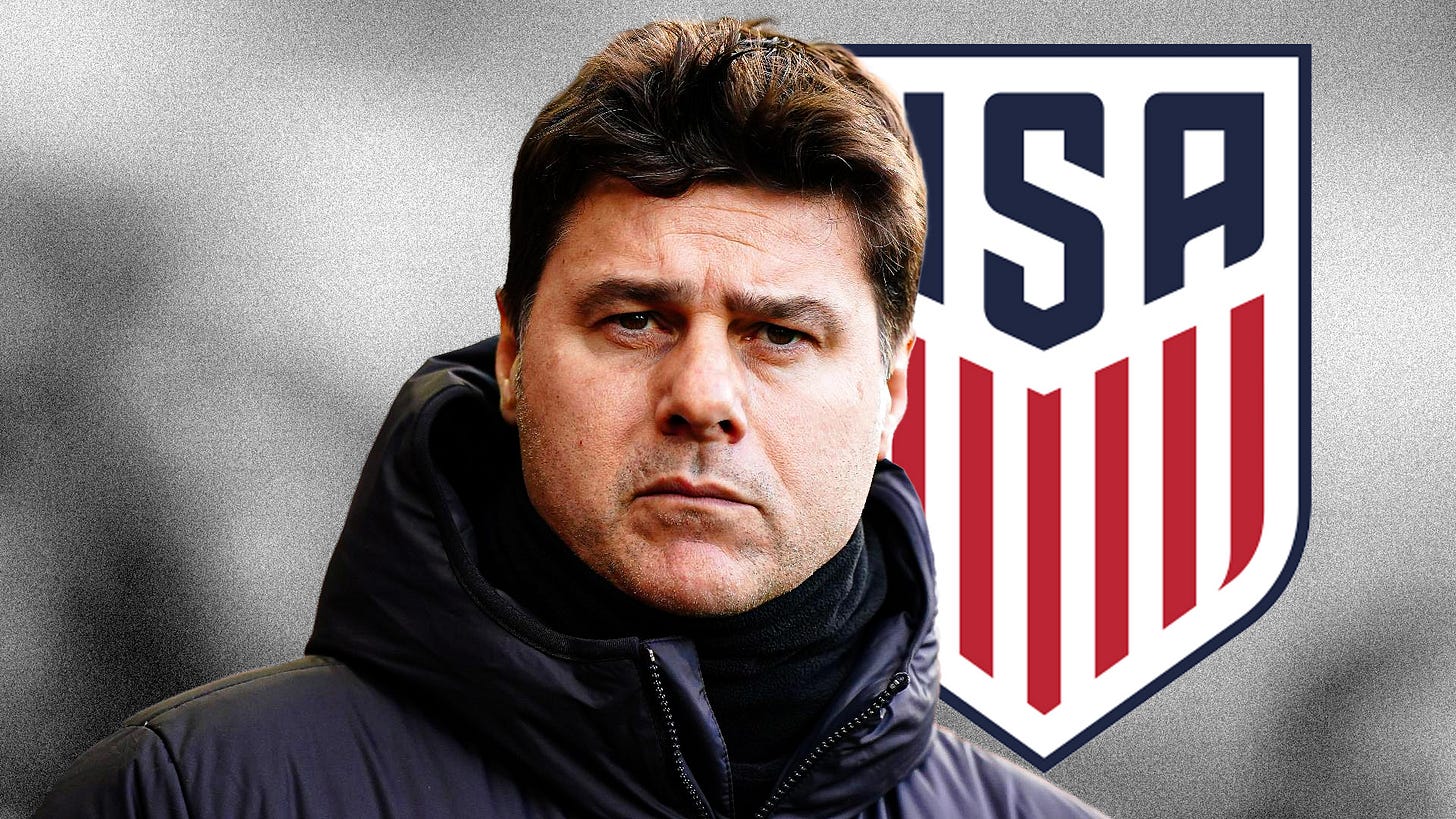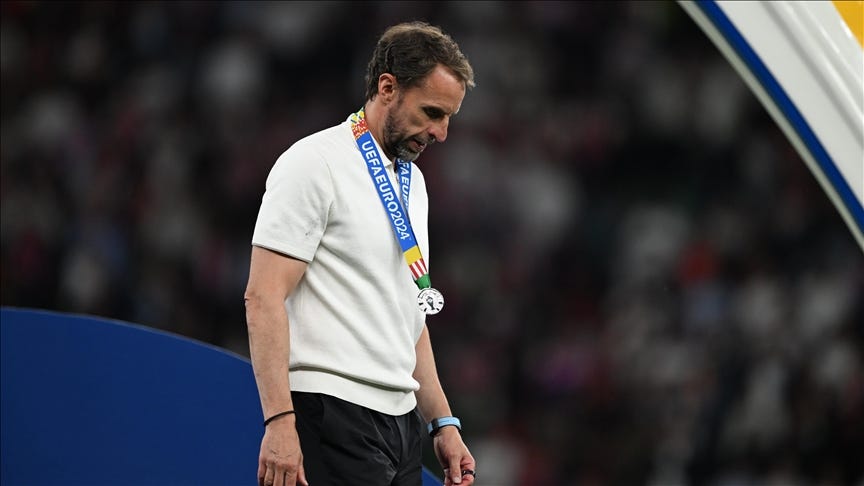Rating each rumored USMNT manager
The abrupt end to Gregg Berhalter’s tenure with the USMNT has left a vacuum at the top, and the federation is now tasked with finding a replacement capable of steering the ship back on course. Among the names circulating, there are a few I wanted to cover in terms of what they might bring to the squad and realistically, what their drawbacks might be. Let’s take a look at the current four leading candidates: Mauricio Pochettino, Gareth Southgate, Steve Cherundolo, and Wilfried Nancy.
Mauricio Pochettino
Mauricio Pochettino is a newer rumor and to me, is the most interesting option, both for his tactical acumen and his reputation for nurturing young talent. But as with any high-profile candidate, there are both pros and cons to consider.
The Positives
Tactical Prowess and Versatility
Pochettino’s tactical flexibility is well-documented. He has shown an ability to adapt his formations and strategies based on the strengths and weaknesses of his squad. During his time at Tottenham and Chelsea, he transitioned seamlessly between a high-pressing 4-2-3-1 and a more conservative 3-4-2-1, often within the same match. This versatility could be a game-changer for a USMNT side that has struggled to find a consistent identity under Berhalter.
Player Development
Pochettino’s knack for developing young players is perhaps his most compelling attribute. He transformed Tottenham into a team capable of competing at the highest levels of European football, largely on the back of young, homegrown talents. Harry Kane, Dele Alli, and Eric Dier are just a few of the players who flourished under his guidance. For a USMNT brimming with young prospects like Gio Reyna, Yunus Musah, and Ricardo Pepi, Pochettino could be the ideal mentor to help them reach their full potential.
Big Stage Experience
Having managed in the Premier League at multiple clubs and taken Tottenham to the Champions League final, Pochettino is no stranger to high-pressure environments. His experience in navigating the intense scrutiny and expectation at the top level would be invaluable as the USMNT looks to reestablish itself on the global stage. The Copa America debacle aside, the upcoming World Cup on home soil looms, and a manager with Pochettino’s pedigree could provide the steady hand needed to handle the weight of expectation.
While this shouldn’t matter as much, he is a very likeable guy and gives the feeling to fans that’s he is a real person. That may be important to consider in terms of who takes over after Gregg.
The Negatives
Style vs. Substance
While Pochettino is renowned for his attractive, high-pressing style of play, there have been criticisms that his teams sometimes lack a cutting edge in the final third. This has been particularly evident in his later years at Tottenham, where the team’s form dipped significantly. For a USMNT that has often struggled with breaking down stubborn defenses, especially in CONCACAF qualifying, this could be a significant concern. The team needs a manager who can not only instill an identity but also ensure that it translates into tangible results.
Inconsistent Success
Despite his obvious talents, Pochettino’s trophy cabinet is relatively bare for a manager of his stature. His most notable achievement remains guiding Tottenham to the Champions League final in 2019, but they fell short at the final hurdle. His subsequent spell at Paris Saint-Germain, while yielding some domestic silverware, was marred by inconsistency and a failure to secure the Champions League – the ultimate prize. At Chelsea the start was extremely slow but many were surprised he was let go after the successful finish to the season. For a USMNT seeking to make a statement on the world stage, questions will inevitably arise about whether Pochettino can deliver when it matters most.
Cultural Fit
The USMNT is a unique proposition, with its own set of cultural and logistical challenges. The blend of MLS-based players and European-based stars requires a nuanced approach to squad management. Pochettino, who has spent the bulk of his managerial career in Europe, may face a steep learning curve in adjusting to the intricacies of managing a national team with such a diverse player pool. His ability to build rapport and cohesion within the squad will be crucial.
Final rating: A-
Gareth Southgate
The resignation of Gareth Southgate following England's narrow loss to Spain in the Euros 2024 final has thrust him into the conversation for the vacant USMNT managerial position. Southgate’s tenure with England was marked by a steady transformation of the team’s fortunes and a series of deep runs in major tournaments. While his pragmatic approach and leadership qualities are undeniable, there are unique factors to consider when evaluating his potential fit for the USMNT.
The Positives
Tournament Experience and Success
Gareth Southgate’s record in major international tournaments is impressive. He led England to the semifinals of the 2018 World Cup, the finals of Euro 2020, and another final at Euro 2024. His ability to navigate the pressure and intricacies of tournament football would be a tremendous asset for a USMNT that has often underperformed on the big stage. His experience in preparing teams for the rigors of knockout football could instill a much-needed competitive edge in the squad.
Defensive Organization and Pragmatism
One of Southgate’s hallmarks is his emphasis on defensive solidity and organization. England’s disciplined and structured approach under his management was a stark contrast to the more chaotic displays of previous eras. For a USMNT that has sometimes lacked defensive cohesion, Southgate’s pragmatic style could provide the stability needed to compete against top-tier opponents. His ability to drill teams in maintaining shape and discipline would be particularly valuable in high-stakes matches.
Player Management and Unity
Southgate has been praised for his man-management skills and his ability to foster a strong team spirit. He built a cohesive, united England squad, often highlighting the importance of character and camaraderie. For a diverse USMNT, where blending the talents of MLS-based players and European stars can be challenging, Southgate’s approach to building a positive team culture could be instrumental. His emphasis on unity and collective effort aligns well with the ethos required to succeed in international football.
The Negatives
Conservative Tactics
While Southgate’s pragmatic approach has its merits, it has also drawn criticism for being overly cautious. His preference for conservative tactics, particularly in big matches, has sometimes stifled England’s attacking potential. For a USMNT that has an emerging generation of attacking talents like Christian Pulisic, Gio Reyna, and Timothy Weah, there may be concerns that Southgate’s conservative style could inhibit their creative freedom and offensive output.
Questionable In-Game Management
Southgate’s in-game management has occasionally come under scrutiny. In crucial moments, his substitutions and tactical adjustments have sometimes been perceived as reactive rather than proactive. In the Euros 2024 final against Spain, some critics pointed to his reluctance to make bold changes that came too late as a factor in the loss. For a USMNT that needs decisive leadership, especially in tightly contested matches, this aspect of Southgate’s approach could be a potential drawback.
Adapting to the US Soccer Landscape
Having spent his entire managerial career within the English football system, Southgate would face the challenge of adapting to the unique dynamics of US soccer. The blend of MLS and European-based players, the vast geographic spread, and the differing competitive environments present a distinct set of challenges. Southgate’s ability to navigate these complexities and build a cohesive, effective squad would be put to the test.
Final rating: B+
Steve Cherundolo
The Positives
Deep Understanding of American Soccer
Cherundolo’s extensive experience within the USMNT setup, both as a player and a coach, gives him an unparalleled understanding of the unique challenges and opportunities within American soccer. He spent his entire playing career at Hannover 96 in Germany, gaining invaluable experience in a top European league while maintaining close ties to US soccer. This dual perspective allows him to bridge the gap between the domestic and international arenas, fostering a cohesive team dynamic.
Player Development and Youth Integration
Cherundolo has demonstrated a keen ability to develop young talent, a crucial attribute given the USMNT's reliance on its burgeoning generation of players. At LAFC, he has been instrumental in nurturing young stars, emphasizing a style of play that encourages creativity and technical proficiency. His commitment to integrating youth into the senior setup aligns perfectly with the USMNT’s current trajectory, with promising talents like Ricardo Pepi, Gio Reyna, and Yunus Musah ready to step up.
Tactical Acumen and Flexibility
Cherundolo’s time in Germany has imbued him with a strong tactical foundation. He has shown a willingness to adapt his tactics based on the strengths of his squad, an approach that could be particularly beneficial for a USMNT that has struggled to find a consistent identity. His preference for high-pressing, possession-based football is in sync with the modern trends of the game, promising an exciting and progressive style of play for the USMNT.
Connection to the Players
As a former USMNT player, Cherundolo brings a level of relatability and understanding that few can match. His experience representing the national team in three World Cups provides him with a unique insight into the pressures and expectations faced by the players. This connection could foster a strong sense of camaraderie and trust within the squad, essential ingredients for building a successful team.
The Negatives
Keep reading with a 7-day free trial
Subscribe to On the Ball with Jake Landau to keep reading this post and get 7 days of free access to the full post archives.








